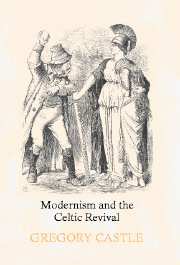Book contents
- Frontmatter
- Contents
- Acknowledgments
- List of abbreviations
- 1 The Celtic muse: anthropology, modernism, and the Celtic Revival
- 2 “Fair equivalents”: Yeats, Revivalism, and the redemption of culture
- 3 “Synge-On-Aran”: The Aran Islands and the subject of Revivalist ethnography
- 4 Staging ethnography: Synge's The Playboy of the Western World
- 5 “A renegade from the ranks”: Joyce's critique of Revivalism in the early fiction
- 6 Joyce's modernism: anthropological fictions in Ulysses
- Conclusion: After the Revival: “Not even Main Street is Safe”
- Notes
- Select bibliography
- Index
Conclusion: After the Revival: “Not even Main Street is Safe”
Published online by Cambridge University Press: 24 November 2009
- Frontmatter
- Contents
- Acknowledgments
- List of abbreviations
- 1 The Celtic muse: anthropology, modernism, and the Celtic Revival
- 2 “Fair equivalents”: Yeats, Revivalism, and the redemption of culture
- 3 “Synge-On-Aran”: The Aran Islands and the subject of Revivalist ethnography
- 4 Staging ethnography: Synge's The Playboy of the Western World
- 5 “A renegade from the ranks”: Joyce's critique of Revivalism in the early fiction
- 6 Joyce's modernism: anthropological fictions in Ulysses
- Conclusion: After the Revival: “Not even Main Street is Safe”
- Notes
- Select bibliography
- Index
Summary
It all seems
A little unreal now,
Now that I am
An anthropologist …
Derek MahonThis study began with a consideration of Yeats's redemptive Revivalism and it is difficult to say whether it does not end in the same way, for even Joyce's critique of the Revival harbors a desire to redeem Ireland from misrepresentations. Stylistically and ideologically, of course, a good deal separates Yeats's attempt to rescue folklore from rationalizations, stereotypes, and “the shallowness of an ascendant and idle class” (FFT, 7) and Joyce's similar attempt to rescue Dubliners from a tradition of Revivalist idealizations. In some ways, as we have seen, Synge serves as a bridge between these two powerful Irish writers, participating both in the project of ethnographic redemption – The Aran Islands stands as the quintessential Revivalist work in this regard – and in the critique of this project, which is limned in The Playboy of the Western World. What all three share is a commitment to an autoethnographic engagement or dialogue with an imperialist anthropology that in an important sense could not have been avoided, given that during the period covered by this study (1888–1922) the Celtic Revival emerged as a cultural movement just as anthropology entered into its modern phase of development, using Ireland as a laboratory, which, as D. J. Cunningham and A. C. Haddon believed, would “no doubt afford valuable information concerning the persistence or otherwise of racial characters.”
- Type
- Chapter
- Information
- Modernism and the Celtic Revival , pp. 248 - 260Publisher: Cambridge University PressPrint publication year: 2001



